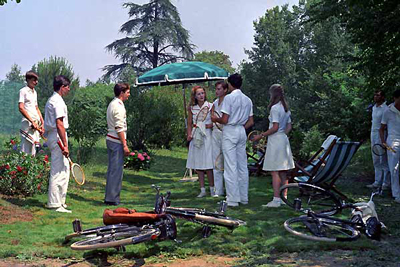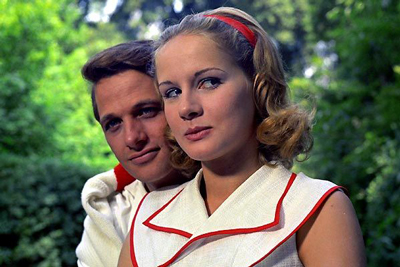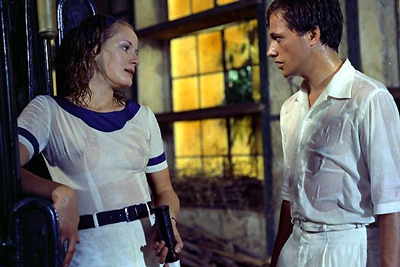
 |
|
|
|
The Garden of the Finzi-Contini was a solid art house hit in the United States in 1971, and took home a best Foreign Film Oscar. As explained by its co-screenwriter Ugo Pirro, a music choice at the finale probably swayed the pro-Israel Academy -- a mournful song is heard over the roofs of Ferrara, as the town's last Jews are rounded up for deportation to concentration camps. Finzi Contini is from a popular book by Giorgio Bassani, a semi-autobiographical account of the effect of Mussolini's anti-Semitic laws between 1938 and 1943. As Italy rushes headlong into a fatal alliance with Nazi Germany, it adopts similar Nazi race laws. Young student Giorgio (Lino Capolicchio of The House of the Laughing Windows) first feels the impact when he's expelled from his tennis club. Not long thereafter Jews are forbidden to engage servants or attend public schools; Giorgio is forced to study privately. Middle class Jews spend more of their time at home, essentially hiding from a hostile political environment. Giorgio finds a semblance of peace at the enormous estate (Garden) of the aristocratic Jewish Finzi Contini family. He and his handsome friend Bruno Malnate (Fabio Testi) bicycle to the modest gate which opens up onto acres of forested property, including a large tennis court. The Finzi Contini have already retreated behind their walls, doing their best to ignore the ugly situation outside. Giorgio is friends with the young and fragile Alberto Finzi Contini (Helmut Berger) and has been in love with the beautiful Micòl (Dominique Sanda of The Conformist since his school days. He finds the slightly imperious family fascinating and their house a safe haven for study (with a library better than the University's). But the quixotic Micòl alternately encourages and rebuffs Giorgio's attentions, at one point leaving to study in Venice to get away from his romantic attentions. 
More severe crackdowns come with the widening of the war in 1941. Giorgio's father (Romolo Valli of Gìu la testa), a former fascist himself, strains to find a way to save his family. Giorgio's brother is sent to study in France, where he learns that Jews, Communists and gypsies are being rounded up all over occupied Europe and sent to camps like Dachau. Bruno is drafted and fears that he will be sent to fight in Russia. Escape for families is almost impossible, as nobody is allowed to take funds out of the country. Micòl's parents have no reaction to these grave events, and Giorgio's parents feel frustrated and helpless. Giorgio makes a bold attempt to make Micòl fall in love with him, but learns a terrible lesson instead. When the Italian Fascists finally get around to arresting all Jews and confiscating their property, there is nothing to do but comply. The Garden of the Finzi Contini (this English release doesn't add an "s" to the title) caused trouble for the legendary director Vittorio De Sica when the author Bassani objected to changes made in the script. But the movie was De Sica's first hit in years. Some risk was involved in that the show revisits an era still sensitive to Italians in 1970. Unlike most movies about the Holocaust, the persecuted Jews in this story are very well off (as with Giorgio's family) or fabulously wealthy like the Finzi Contini. Already separate from the rest of Italian society, they quietly draw ranks and retreat when the anti-Semitic edicts come down. Bassani sees the youngsters happily playing in their tennis togs and talking about schools and who's running around with whom. They're a lot like teenagers from a latter period, with money to spend and no economic worries. 
But the pressure shows in other ways. Alberto reacts to the edicts with a slow deterioration of his health. Before the family opens their tennis court up to their friends, almost the only person Alberto sees is his sister Micòl, to the point where the relationship might seem incestuous to an outsider. (Despite the fact that Micòl reads Cocteau's Les enfants terribles, they are not). Giorgio does his best to win Micòl and is repeatedly confused by her mixed signals. Opinions vary about what is going on; to these eyes it looks as if Micòl's intuition tells her that there is no future, and she has decided to become serious about nobody. Only Giorgio's father is taking proactive steps against the inevitable. The leisurely pace of The Garden of the Finzi Contini emphasizes absurd formalities as the world closes in on the illusory safety of the Finzi Contini garden. Although these people know well the history of pogroms and persecution, the young among them are caught in the traps just as surely. Giorgio could stay in France with his brother (and perhaps buy himself a couple of years of liberty) but chooses to come back to court Micòl. None of his friends talk about running away; all are too loyal to their comfortable family situations. De Sica uses a few flashbacks fairly effectively, although they're filmed as a gauzy cliché. HIs specialty is working with actors, and some of the scenes with Micòl and Giorgio are remarkable, including one highly erotic encounter in the carriage house in a rainstorm. Despite Micòl's confusing behavior Giorgio never gives up hope, and even decides at one point that she's perversely goading him to become more physical. Her final "explanation" of why she doesn't love him makes some sense but is bitterly frustrating. We of course are thinking that they're wasting time on petty issues of the heart instead of making plans to survive. Giorgio doesn't realize how serious things are until a gypsy girl at a carnival tells him that plainclothes fascist police are arresting any and all Jews they find on the street. 
Viewers unfamiliar with the source story have expressed difficulties keeping the characters straight. The actor playing Giorgio initially looks quite a bit like Helmut Berger's Alberto, and even Bruno gets lost in there as well -- some viewers don't recognize him in his last, crucial scene. The film's success is its recreation of a doomed society of genteel, educated urban Italian Jews just before the Holocaust. The movie doesn't need to drag its characters into the next step of the process -- other movies have told that part of the story all too frequently. Arrow Academy's UK release of The Garden of the Finzi Contini is a handsome PAL Region 0 DVD with good color and very clear sound -- it's amusing when these well-off teens reach into their neat 78rpm record collections to play a hit swing tune from America. For extras, Arrow comes up with an original Italian trailer and three very apt interviews. Actor Lino Capoliccio recalls being directed by De Sica, whose method was to take the place of every actor, even the women, to show how he wanted a scene played. Writer Ugo Pirro offers a number of privileged remarks about the film's casting and the writers that worked on it. He believes Bassani's court case was prompted by a desire to sell more reprints of his famous book. De Sica's son and Finzi Contini composer Manuel De Sica fills in more information about his father and the effect of the film on his career, which was not doing well at the time. De Sica the younger says that his father had cpnsidered directing as a simply a job since at least 1957, and more than once described himself as more of an acting coach than a film director, anyway.
On a scale of Excellent, Good, Fair, and Poor,
The Garden of the Finzi Contini rates:
Reviews on the Savant main site have additional credits information and are often updated and annotated with reader input and graphics. Also, don't forget the 2010 Savant Wish List. T'was Ever Thus.
Review Staff | About DVD Talk | Newsletter Subscribe | Join DVD Talk Forum |
| ||||||||||||||||||